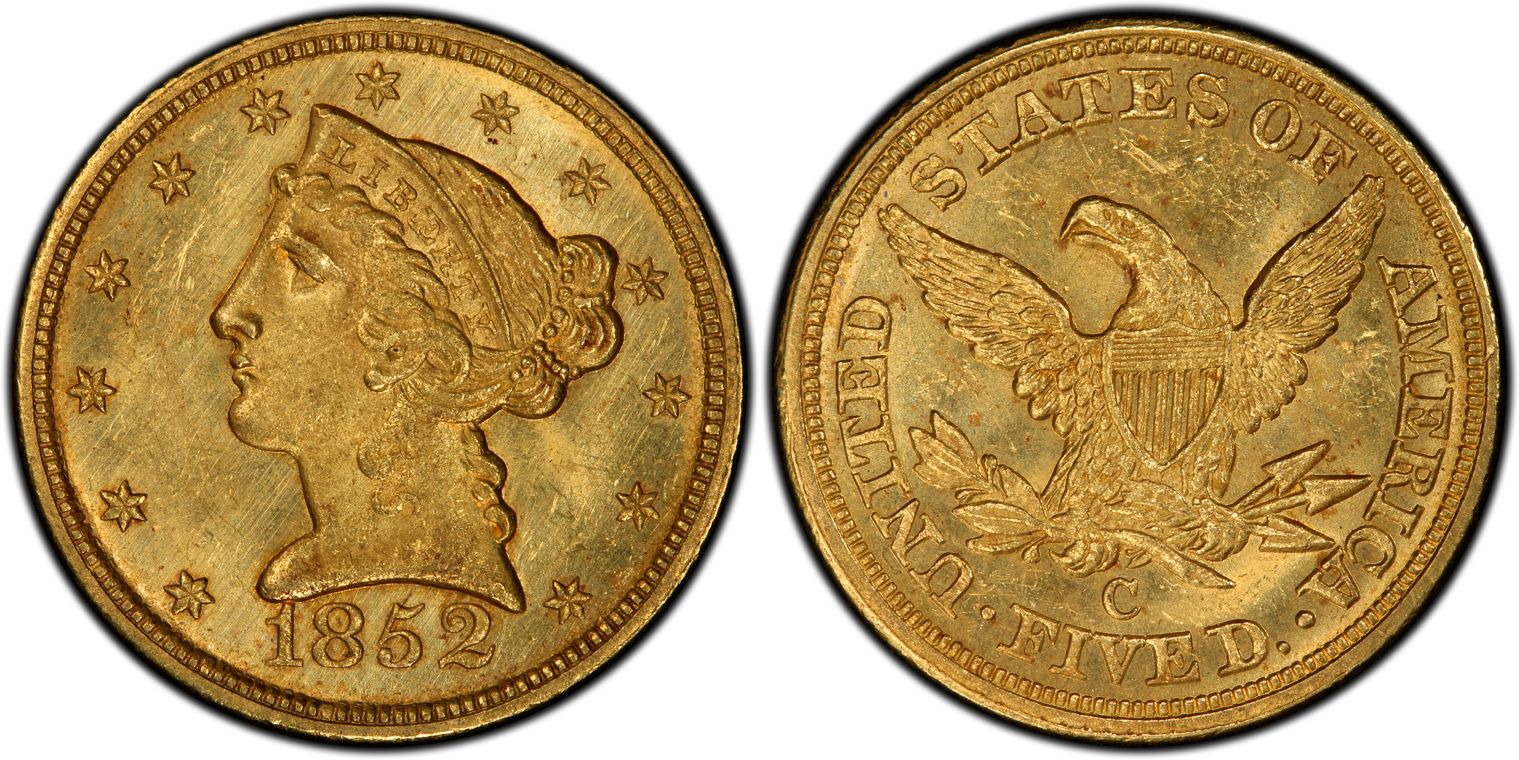1852-C $5 MS63+ 认证号25540015, PCGS号8251
拥有者评论
2 Finer at CAC
专家评论
Doug Winter
The 1852-C has the second highest mintage figure of any half eagle from the Charlotte Mint. It is relatively easy to obtain in lower grades and has become comparatively available in Uncirculated due to the presence of one hoard found in the mid-1980s and another that hit the market in the Winter of 2007.The 1852-C is reasonably easy to locate in the lower circulated grades and is only marginally scarce in the lower About Uncirculated grade range. It is scarce in AU55 to AU58 and very scarce in Uncirculated. Due to the discovery of approximately nine coins in two different hoards since 1986, the 1852-C is now among the more available Charlotte half eagles in Uncirculated, especially in MS63 and MS64 grades. Gems remain exceedingly rare.
STRIKE: Most 1852-C half eagles show noticeable weakness at the central obverse. The curls below BERT in LIBERTY are sometimes partially visible but on most known pieces they are weak. The rest of the obverse is better struck, with good detail seen on the bun and at the top of the head. The curl below the ear is usually weak while the stars and the denticles are sharp. The reverse shows weakness on the neck feathers and the top of the shield. The wings are sharp with the feathers boldly detailed, even on the tips. The legs and the claws typically show some weakness. Unlike some of the other dates from the first half of the 1850s, the 1852-C is always found with a strong mintmark.
SURFACES: It is nearly impossible to find an 1852-C half eagle without very heavily abraded surfaces. These abrasions are usually deep and detracting. On higher grade pieces, striations can sometimes be seen in the obverse and reverse fields; these are not generally seen on lower grade 1852-C half eagles. The bust and the eagle show varying amounts of die rust, which suggests that the punches used to make these dies may have been fairly old before they were used.
LUSTER: There are two types of luster seen on 1852-C half eagles. Most show a grainy, somewhat dull texture with an almost semi-matte finish that can sometimes appear to be slightly reflective. A smaller number show thick, frosty luster which is among the best seen on any Charlotte half eagle for the 1850s. Examples are also known with matte surfaces from exposure to seawater. These are supposedly from a civil war shipwreck that was salvaged in the early 1970s. While they show Mint State detail, they are generally accorded the value of an Extremely Fine with original surfaces.
COLORATION: The natural coloration for this issue is a medium to deep green-gold that is sometimes accentuated by attractive orange-gold toning. Coins with original color are more available than for most dates but are becoming harder and harder to locate each year.
EYE APPEAL: The eye appeal of the 1852-C is generally above-average. One can expect to see weakness of strike at the centers but there are still a decent number of attractive pieces with good color and luster. However, even these attractive examples tend to show numerous abrasions in the fields.
DIE CHARACTERISTICS: As mentioned above, many 1852-C half eagles show die rust on the portrait of Liberty and, less extensively, on the eagle. On high grade examples, there is a tiny die scratch that runs down from the denticles towards the right serif of the E in STATES.
DIE VARIETIES: There are two varieties known.
Variety 1 (formerly Variety 18-H): The date is high, with the 1 touching the bust and the 2 very close to it. The reverse was used in 1852 and again in 1853. It has a large mintmark that is centered over the V in FIVE. The right edge of the mintmark is positioned over the right serif of the V while the left edge is the left serif.
This is the more common of the two varieties.
Variety 2 (formerly Variety 19-H): The date is not as high and is further to the left than on Variety 1. The 1 is close to the bust but does not touch it while the 2 is clearly not as close to the bust as on Variety 1. The reverse is the same as described above.
This is the scarcer of the two varieties.
David Akers (1975/88)
The 1852-C is one of the more common Charlotte Mint Half Eagles and although VF and EF are the grades normally seen, AU pieces are sometimes available. A few uncirculated specimens are also known, but the date must be considered extremely rare in choice condition.PCGS #
8251
设计师
Christian Gobrecht
边缘
Reeded
直径
21.65 毫米
重量
8.36 克
铸币数量
72574
金属成分
90% Gold, 10% Copper
更高评级数量
5
评级较低的钱币数量
270
地区
The United States of America
价格指南
PCGS 数量报告
拍卖 - PCGS 评级的
拍卖 - NGC 评级的
稀有性和存量估计 了解更多
| 所有评级 | 650 |
| 60或以上 | 22 |
| 65或以上 | 0 |
| 所有评级 | R-5.7 |
| 60或以上 | R-9.0 |
| 65或以上 | R-10.1 |
| 所有评级 | 106 / 112 TIE |
| 60或以上 | 89 / 112 TIE |
| 65或以上 | 1 / 112 |
| 所有评级 | 150 / 218 TIE |
| 60或以上 | 120 / 218 TIE |
| 65或以上 | 1 / 218 |





















